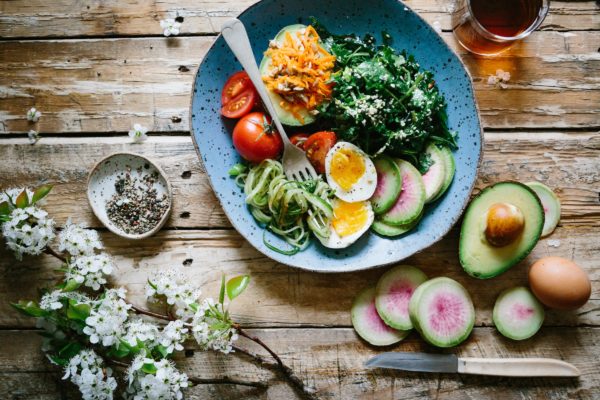Did you know that about one in ten adults in the United States struggles with a fertility issue? When you’re looking to start or expand your family, you may wonder if your fertility or ability to conceive a biological child is good enough to get pregnant.
If you are having trouble conceiving a child, your doctor may suggest trying certain lifestyle changes to help improve your chances. From changing your diet to ensuring you’re not overexercising, there are plenty of simple ways to improve your chances of conceiving. Read below to learn more about some science-backed lifestyle changes you can make to help support fertility.
What Do I Need To Know About Fertility?
Before we jump into our top science-backed lifestyle changes, it’s first essential to understand the process of fertility and what is considered infertility. To begin, the process of conception requires normal production and release of mature eggs and sperm, as well as a way for the egg and sperm to meet.
If a couple has frequent, unprotected sex for 12 months and is still unable to conceive, this is when infertility occurs. If you’re 35 or older, you’re considered to have infertility after 6 months of unprotected and frequent sex with no conception.
Not being able to conceive is not a sexual disorder, but a problem with the reproductive system that can result from various medical issues, such as
- Ovulation disorders that impact the release of eggs from the ovaries, which include polycystic ovary syndrome, hyperprolactinemia, or thyroid issues
- Polyps or fibroids in the uterus
- Fallopian tube damage or blockage, typically caused by pelvic inflammatory disease
- Early menopause
- Pelvic adhesions, or scar tissue binding organs after pelvic infection or surgery
- Menstruation issues caused by issues like celiac disease, poorly controlled diabetes, or autoimmune disorders like lupus
- The decline of sperm quality with age
- Sexually transmitted diseases like chlamydia or gonorrhea
Lifestyle Factors That Can Impact Fertility
If you don’t have any of the health issues listed above but still have trouble conceiving, it may help to look at your lifestyle. Experts suggest that the following lifestyle factors may have a negative impact on fertility, and by limiting or avoiding them altogether, you may improve your chances of boosting your fertility naturally:
Smoking
Smoking can cause a variety of health issues that can impact fertility. Experts report that smoking of any kind can age your ovaries, deplete egg reserves prematurely, and increase the risk of ectopic pregnancy. Smoking can also reduce your chances of successful fertility treatments, so avoiding cigarettes is crucial if you’re trying to conceive.
Alcohol intake
You may have heard that red wine is good for your heart. However, when it comes to fertility, too much alcohol can actually have a negative impact. Even two to four standard drinks of alcohol per week can increase the risk of miscarriage. One standard drink is equal to 12 ounces of beer, 5 ounces of wine, or 1.5 ounces of hard liquor.
Not to mention that regular drinking can increase the risk of ovulation disorders. Plus, it can reduce sperm quality, steroid hormone production, and ovarian egg reserve. Health experts suggest not drinking alcohol at all when trying to conceive to best improve your chances.
Caffeine Intake
Although you may consume 200 milligrams of caffeine a day without fertility risk, any more than this may impact fertility. Therefore, it’s best to stick to, at most, the equivalent of one to two six-to-eight-ounce servings of coffee each day while trying to boost fertility.
Exercise
Exercise is a wonderful way to keep your body healthy, but too much of it can hinder ovulation and lower levels of progesterone which can reduce fertility. Therefore, you should try to limit vigorous exercise to no more than five hours each week. Examples of vigorous exercise include hiking, jogging, or cycling at 6 miles per hour or faster, as well as basketball, soccer, or tennis games.
Exposure To Chemicals And Pesticides
Lastly, when trying to become pregnant, be sure to avoid exposure to chemical solvents and pesticides. And finally, unlike some rumors you may see online, research of 2000 women regarding the impact of the COVID-19 vaccine on fertility has found that this vaccine did not reduce the chances of conception. However, having a male partner that tests positive for the actual COVID-19 virus within 60 days of attempting conception did lower the chances of fertility.
Foods That Can Boost Fertility
Although there are no foods that are known to cause infertility, there are some foods that can help boost fertility. Here are a few examples of fertility-boosting foods to consider adding to your diet:
Increase Water Intake
Remember to drink plenty of water each day to help support hormonal balance and overall health. The amount of fluid a person needs for optimal health varies. Look for lemonade-colored urine as an indicator that you’re properly hydrated.
Consume Plenty Of Fiber
One of the best ways to boost fertility is by consuming plenty of fiber from whole grains, fruits, and vegetables. Eating enough fiber-rich foods can assist with overall health and support healthy digestion. Also, such foods contain good amounts of iron and vitamin C. Vitamin C-rich foods like citrus fruits, tomatoes, and bell peppers, for example, help absorb iron in the body. Adequate iron levels also help to prevent issues like anemia and support healthy fertility.
Eat Enough Folic Acid Every Day
Folic acid can help support fertility and reduce the risk of neural tube defects in your baby once you conceive. Women trying to become pregnant should consume at least 400 micrograms of folic acid. This could be through foods or supplements for healthy fertility. Vegetables like spinach and kale, as well as fortified cereals and grains, are good sources of folic acid.
Increase Calcium And Nutrients
When trying to become pregnant, you should be sure to take a multivitamin made for women of childbearing age, such as a prenatal multivitamin or fertility foundation vitamin. You should also be sure to consume enough calcium, at least 1000 milligrams daily. This can be through supplements or foods such as milk, yogurt, cheese, cottage cheese, fortified cereals, or plant-based milk.
Final Note On Boosting Fertility
When trying to boost fertility and become pregnant, it’s essential to focus on your overall health. Eating a balanced diet rich in fertility-boosting foods, taking prenatal vitamins, reducing alcohol intake, and limiting exercise can all help improve your chances of conception.
Talk with your doctor if you have concerns about your fertility or difficulty becoming pregnant. They can provide you with more information and fertility treatments if necessary. Plus, doctors can help you figure out which days of your cycle you are ovulating. This way, you can plan for having intercourse on such days to increase your risk of conception.




